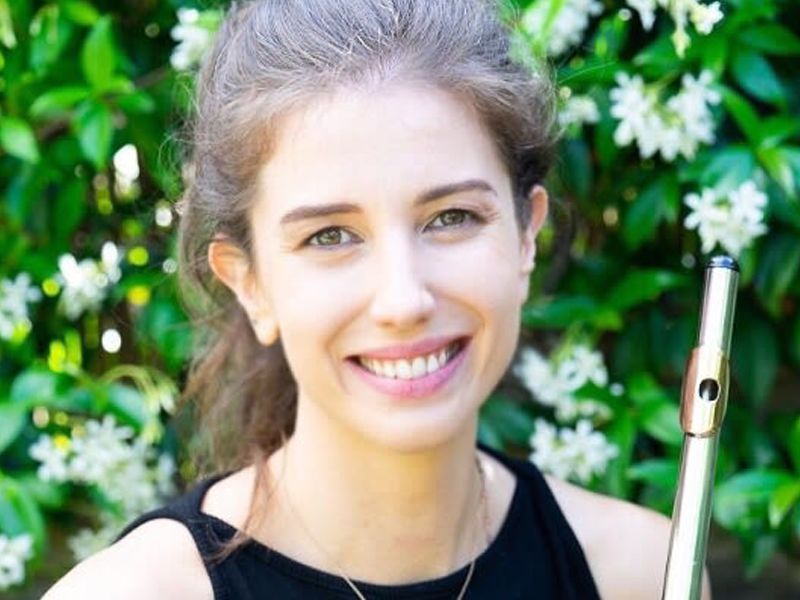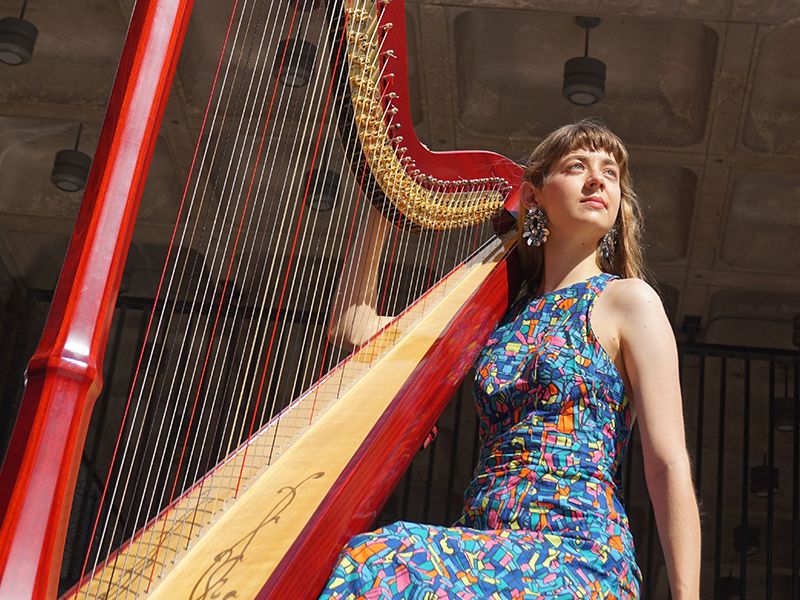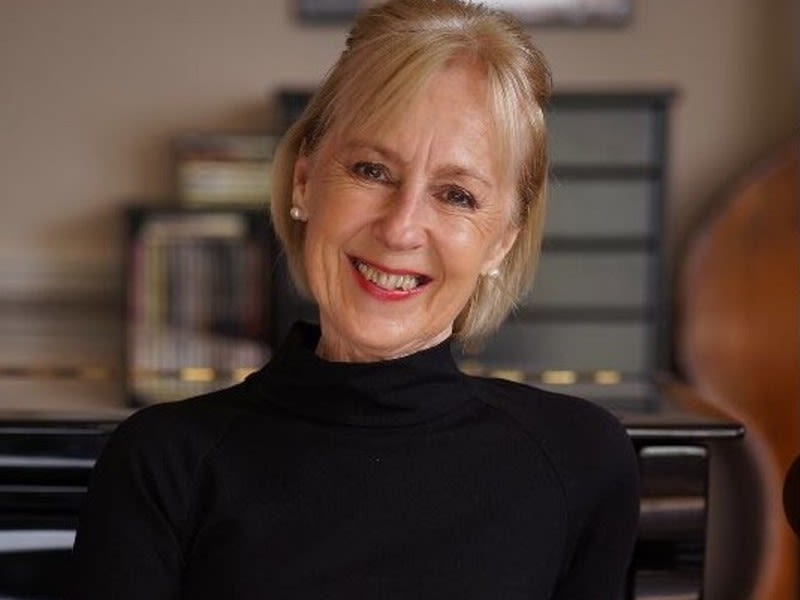LSO Discovery
Friday
Lunchtime Concert: Relaxed performance
Friday 1 April 2022 12.30pm

Welcome to LSO St Luke's and this Free Friday Lunchtime Concert.
YOUR DIGITAL CONCERT GUIDE
You can use your phone to view this digital guide during the concert, and discover more about the music and performers.
Navigate using the menu icon (≡) at the top of the screen.

There is free WiFi available in the Jerwood Hall. Connect to the 'hawksmoor' network.
So that everyone can have the best experience, please set your phone to silent and only use it during the performance to read these notes. Photos can be taken during applause at the end of the concert.

Today's Programme
Christoph Willibald Gluck Dance of the Blessed Spirits from 'Orfeo ed Euridice'
Francisco Tárrega Recuerdos de la Alhambra
Ian Clarke The Great Train Race
J S Bach Sicilienne from Flute Sonata in E-flat major
Pearl Chertok Harpicide at Midnight from 'Around the Clock Suite'
Astor Piazzolla Bordel 1900 from 'Histoire du Tango'
Stephanie Tepper flute
Helena Ricci harp
Rachel Leach presenter
Angie Newman BSL interpreter
This performance is broadcast live on youtube.com/lso and is available to watch for free after broadcast.
Captions courtesy of StageText.

Makaton symbols are used with the kind permission of The Makaton Charity, all rights reserved.
© The Makaton Charity 2022. Makaton is a registered Trade Mark and Service Mark of TMC.
Christoph Willibald Gluck (1714 to 1787)
Dance of the Blessed Spirits from 'Orfeo ed Euridice'
✒️ 1762 | ⏰4 minutes

Christoph Willibald Gluck was an extremely famous and important composer of opera who radically changed the form and made it more accessible to new audiences. In short, he increased the drama, cut the length and simplified the storytelling. His most famous work is Orfeo ed Euridice which tells a very sad tale.
Orfeo is a musician with great powers. When his wife dies he must use his music to lead her out of hell and back to life but he must not look at her as he does so. He begins playing and Euridice follows but after a while he is unable to continue without glancing back at her beauty and so she is lost forever. 'Dance of the Blessed Spirits' describes Orfeo’s sadness as he stands surrounded by earth and nature but without his great love.
Note by Rachel Leach
Francisco Tárrega (1852 to 1909)
Recuerdos de la Alhambra
✒️ 1899 | ⏰5 minutes

Spanish composer and guitarist Francisco Tárrega is known as the father of classical guitar and one of the greatest guitarists of all time. After an accident injured his sight as a child the family gave him guitar lessons (with two blind teachers) thinking it was good therapy but also a possible career option if his sight didn’t return. Happily, his sight did return but he loved the guitar so much that he ran away from home three times, afraid his family would take the lessons away. Eventually he settled down and studied at the Madrid Conservatory and became very famous across Europe by the age of 30.
This piece was written on a trip to Alhambra and is dedicated to the wealthy patron who funded the trip. It is extremely difficult to play on guitar because of its constant tremolo technique.
Note by Rachel Leach
Ian Clarke (b 1964)
The Great Train Race
✒️ 2000 | ⏰4 minutes

Ian Clarke is a flute player, teacher, composer, mathematician, and rock musician! Born in Broadstairs, Kent, Clarke began his musical life with lessons on recorder and piano. He became so fascinated with the flute that he initially taught himself before gaining a place at the Guildhall School. He then switched direction and took a degree in mathematics from Imperial College where his love of rock music led to him forming a band, which became quite successful.
Since 2000 he has been fully back in the flute world, teaching at the Guildhall and as guest professor across the UK. He also composes and this piece has become iconic. It describes an exciting journey by train and along the way the player has to master many extended and unusual playing techniques such as singing and playing at the same time, extremely fast tonguing and circular breathing!
Note by Rachel Leach
J S Bach (1685 to 1750)
Sicilienne from Flute Sonata in E-flat major BWV 1031
✒️ c 1732 | ⏰ 4 minutes

J S Bach is regarded by many to be the greatest composer of all time. Writing at a time when composers had to churn out dozens of pieces each week for religious services, ceremonies and celebrations, Bach was very much a servant to a string of wealthy patrons writing whatever pieces were required and struggling to earn enough to support his large family.
During Bach’s lifetime ‘sonata’ just meant a piece for soloist with several movements. This one had three and the 'Sicilienne' was placed in the middle. It is a slow dance form in a minor key and it is gentle and elegant.
Note by Rachel Leach
Pearl Chertok (1918 to 1981)
Harpicide at Midnight from 'Around The Clock Suite'
✒️ c 1950 | ⏰3 minutes

Pearl Chertok was a harp superstar! Born in New York, Chertok quit ballet lessons and flute to concentrate on the harp whilst at High School. She then trained at the prestigious Curtis Institute of Music in Philadelphia with French harp superstar Carlos Salzedo before taking a job with the CBS Television Orchestra. This led to several TV appearances and fame. Throughout her career she also taught and composed.
This piece is from her Around the Clock suite and features her signature jazzy sound. Listen out for knocking on the harp’s body and zingy fingernail glissandos (slides up and down the strings).
Note by Rachel Leach
Astor Piazzolla (1921 to 1992 )
Bordel 1900 from 'Histoire du Tango'
✒️ 1985 | ⏰ 4 minutes

Argentine composer Astor Piazzolla caused much controversy when he created a new style of tango music in the 1960s by combining jazz and contemporary classical techniques. In 1985, at the height of his fame, he used the Histoire du Tango suite to describe the changes that had taken place to tango music over the century.
'Bordel 1900' describes the beginning of tango when it was performed by flute and guitar (substituted here by harp) and was graceful and lively. Within the music there are moments when the instruments ‘talk’ to one another and this represents the seductive ladies of the bordello teasing passers-by.
Note by Rachel Leach
« Bordel 1900 » from Histoire du Tango by Astor Piazzolla
© Editions Henry Lemoine, Paris. All right reserved
Used by permission://www.henry-lemoine.com/fr/catalogue/fiche/28251
Artist Biographies

Stephanie Tepper
flute


Stephanie Tepper started her musical education at the Royal Northern College of Music, where she studied with Peter Lloyd (Ex-Principal of the LSO) for four years. Having graduated with a first class honours (BMus) in 2011, Stephanie successfully auditioned for the Foyle Future Firsts Orchestral Scheme with the London Philharmonic Orchestra which enabled her to learn and work with the orchestra for a year. In 2016, Stephanie went on to study for a Masters degree on the Orchestral Artistry course at the Guildhall School of Music and Drama in London under the tuition of Gareth Davies (LSO Principal), Sarah Newbold (St Martin-in-the-Fields), Ian Clarke (internationally renowned solo artist and composer) and Christopher Green (Principal Piccolo, Orchestra of the Royal Opera House). In 2017, she graduated with a distinction.
Stephanie has had much success as an orchestral musician and has appeared as guest principal for and subsequently trialled for the position of second flute with the Hallé orchestra, Scottish Opera and the Welsh National Opera. Stephanie has also made regular appearances with the London Symphony Orchestra, Liverpool Philharmonic Orchestra, London Philharmonic Orchestra, BBC Philharmonic Orchestra and Opera North. Her orchestral work has also allowed her to perform in some of the greatest venues around the world including La Philharmonie de Paris, Mariinsky theatre in St Petersburg, Dvořák Hall in Prague and the famous National Concert Hall in Beijing. As a session musician, Stephanie has worked at Abbey Road Studios and been invited to play on a number of charity singles, including Kristoff Gildenlow's progressive metal album, which was released in 2015.
Teaching and educational work is a hugely important feature of Stephanie's life. Since graduating from the Guildhall, Stephanie now has the privilege of working with LSO Discovery: a world-leading educational and community-based programme that offers inspiring musical experiences to people of all ages and backgrounds. In 2017, she gained a place on the Spitalfield's Music Leadership training scheme and also attended workshop training with the charity Jessie's Fund to enable her to work with children and adults with disabilities. In September 2020, Stephanie began studying for an MA in Music Therapy at the Guildhall School of Music & Drama and is hoping to graduate in 2023.

Helena Ricci
harp


Helena Ricci is a Swiss harpist praised for her moving playing, numerous transcriptions of famous works, creativity and entrepreneurial spirit. Solo performances include venues such as the Wigmore Hall, St Martin-in-the-Fields as well as many high profile events in London. She is an alumna of the Guildhall School of Music & Drama, took part in the Encuentro de Santander, Philharmonie der Animato, Britten-Pears Young Artist Programme, Westfield Presents Artist and the Tuning In! Artist programme in partnership with The University of Music and Performing Arts in Vienna. Despite the odds, Helena Ricci made her West End debut during the pandemic.
As a Guildhall Creative Entrepreneur she is the founder of MUSILUX, an innovative project merging classical music and digital technology for mesmerising immersive performances. Embracing the artistic freedom of being able to release music herself, she is currently working on her first classical solo harp CD on the theme of solitude and human connection.

Angie Newman
BSL interpreter

Angie Newman has worked extensively across music and deaf education for many years. Her knowledge and expertise in these areas, combined with her skills as both a British Sign Language interpreter and a musician, enable her to make music more accessible to young deaf people and adults, bridging the worlds of deafness and music, something she feels passionate about.
She has worked for six successive years with the BBC interpreting family Proms, including CBeebies Proms. She works with a variety of leading orchestras in the UK, including the London Symphony Orchestra, London Philharmonic Orchestra, Philharmonia Orchestra and many others, interpreting for their education and community programmes. Angie loves to relax by walking, cycling, playing the piano and violin, and practising yoga.
In today's concert, Angie will be adapting her British Sign Language interpretation to include more visual and gestural elements.

Next Friday Lunchtime Concert

Friday 8 April 12.30pm

Haydn Piano Trio No 44 in E Major
Reena Esamail Saans
Belinda McFarlane violin
Jennie Brown cello
Elizabeth Burley piano
Rachel Leach presenter
Future Lunchtime Concerts
Friday 29 April 12.30pm
Friday 20 May 12.30pm
Friday 17 June 12.30pm (Relaxed performance)

In 2020 we launched the Always Playing Appeal to help the LSO and LSO St Luke's rebuild a secure future following the Covid-19 pandemic.
With the help of our audiences and supporters, we can continue bringing the greatest music to people in London and beyond.
You can also donate now via text.
Text LSOAPPEAL 5, LSOAPPEAL 10 or LSOAPPEAL 20 to 70085 to donate £5, £10 or £20.
Texts cost £5, £10 or £20 plus one standard rate message and you’ll be opting in to hear more about our work and fundraising via telephone and SMS. If you’d like to give but do not wish to receive marketing communications, text LSOAPPEALNOINFO 5, 10 or 20 to 70085. UK numbers only.
The London Symphony Orchestra is hugely grateful to all the Patrons and Friends, Corporate Partners, Trusts and Foundations, and other supporters who make its work possible.
The LSO's return to work is generously supported by DnaNudge.


